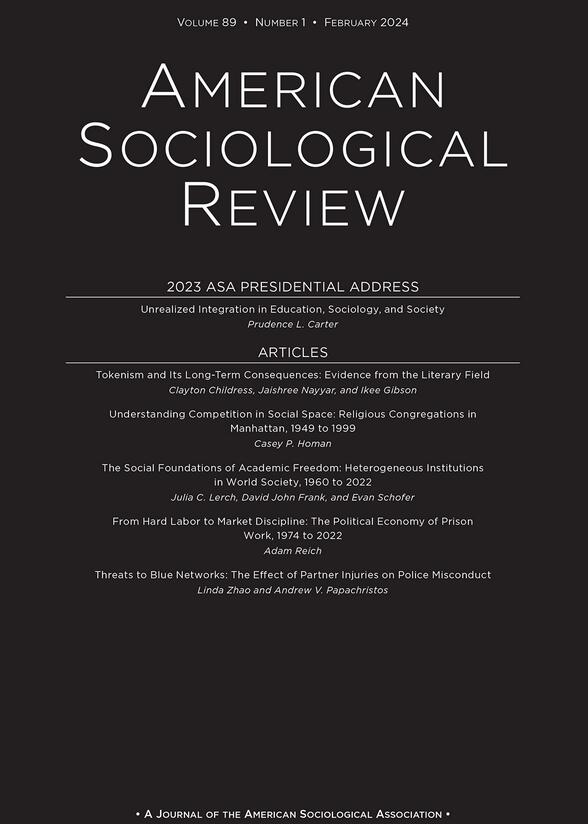专业技术:阿片类药物与疼痛管理的可信度危机
IF 6.2
1区 社会学
Q1 SOCIOLOGY
引用次数: 3
摘要
关于阿片类药物危机的新闻报道经常将处方阿片类药描绘成有盈利意识的制药公司的工具,这些公司招募疼痛专家来过量处方成瘾药物。这篇文章超越了对制药力量的关注,对全球阿片类药物处方率的上升提供了一个基于职业间和职业内动态的比较历史解释。通过档案分析和对美国和法国疼痛专家和公共卫生官员的深入采访,我解释了阿片类药物如何以及为什么在20世纪80年代和90年代成为止痛的“正确工具”,影响了疼痛科学的产生、疼痛管理的实施,以及在不同国家背景下承诺的止痛权利。我认为,阿片类药物被选为止痛技术并被消除了污名,有助于建立 全球疼痛专家网络,将新兴的疼痛专家领域与全球卫生治理、公共卫生管理、人道主义组织和制药公司的资源联系起来。然后,我比较了美国和法国疼痛专家如何利用阿片类药物来加强其新兴领域的边界。疼痛专家在每个国家的疼痛专业知识网络中拥有不同程度的自主权,这决定了阿片类药物在多大程度上可能主导疼痛管理并导致危机。追踪阿片类药物和疼痛专业知识之间的关系,我展示了如果技术逃脱了选择它们的网络领域的控制,它们如何会引发专家可信度的危机。本文章由计算机程序翻译,如有差异,请以英文原文为准。
Technologies of Expertise: Opioids and Pain Management’s Credibility Crisis
Journalistic accounts of the opioid crisis often paint prescription opioids as the instrument of profit-minded pharmaceutical companies who enlisted pain specialists to overprescribe addictive drugs. Broadening beyond a focus on pharmaceutical power, this article offers a comparative-historical explanation, rooted in inter- and intra-professional dynamics, of the global increase in rates of opioid prescribing. Through archival analysis and in-depth interviews with pain specialists and public-health officials in the United States and France, I explain how and why opioids emerged as the “right tool for the job” of pain relief in the 1980s and 1990s, affecting how pain science is produced, pain management is administered, and a right to pain relief is promised in different national contexts. I argue that opioids, selected and destigmatized as the technology for pain relief, helped establish a global network of pain expertise, linking a fledgling field of pain specialists to the resources of global-health governance, public-health administration, humanitarian organizations, and pharmaceutical companies. I then compare how U.S. and French pain specialists leveraged opioids to strengthen the boundaries of their emergent fields. Pain specialists’ differing degrees of autonomy in each country’s network of pain expertise shaped the extent to which opioids could dominate pain management and lead to crisis. Tracing the relationship between opioids and pain expertise, I show how technologies can drive crises of expert credibility if and when they escape the control of the networked fields that selected them.
求助全文
通过发布文献求助,成功后即可免费获取论文全文。
去求助
来源期刊

American Sociological Review
SOCIOLOGY-
CiteScore
13.30
自引率
3.30%
发文量
35
期刊介绍:
The American Sociological Association (ASA) is a non-profit membership association established in 1905. Its mission is to advance sociology as a scientific discipline and profession that serves the public good. ASA is comprised of approximately 12,000 members including faculty members, researchers, practitioners, and students in the field of sociology. Roughly 20% of the members work in government, business, or non-profit organizations.
One of ASA's primary endeavors is the publication and dissemination of important sociological research. To this end, they founded the American Sociological Review (ASR) in 1936. ASR is the flagship journal of the association and publishes original works that are of general interest and contribute to the advancement of sociology. The journal seeks to publish new theoretical developments, research results that enhance our understanding of fundamental social processes, and significant methodological innovations. ASR welcomes submissions from all areas of sociology, placing an emphasis on exceptional quality.
Aside from ASR, ASA also publishes 14 professional journals and magazines. Additionally, they organize an annual meeting that attracts over 6,000 participants. ASA's membership consists of scholars, professionals, and students dedicated to the study and application of sociology in various domains of society.
 求助内容:
求助内容: 应助结果提醒方式:
应助结果提醒方式:


